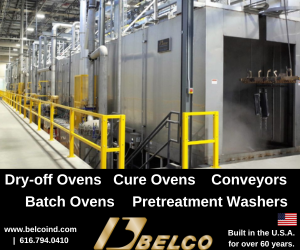Zinc vs. Iron Phosphate
Question: I have a technical question from a vendor, which I will pass on to you.
Question:
I have a technical question from a vendor, which I will pass on to you. I have a mount that is to sit on the deck of a ship and so needs salt spray protection. We have, until now, specified zinc phosphate coating then primer and topcoat. This vendor (new for the next group of units) is asking to change to iron phosphate and lists several attributes for several reasons, two of which are better adhesion for paint and greater resistance to salt spray. In researching this issue, we come across your web site where you say: “Iron Phosphate...is useful where corrosion resistance requirements are not of the highest levels. Zinc Phosphate...provides inherently better corrosion resistance than iron.” This seems to contradict the vendor’s statement.
I am not trying to point out errors on anyone’s part, but I am by no means a paint expert. Can you give me some additional insight as to the quality of the iron coatings? I know that some of the additional reasons given by the vendor are time and cost as well. (They have to go to Georgia for the zinc, and can do the iron either in-house or in state at least.) Thanks. P.K.
Answer:
I stand by my previous statement. My experience and generally accepted practice in the metal finishing industry is to specify zinc phosphate where corrosion protection is necessary. There are probably two reasons for this. In general, the zinc phosphate produces a much heavier coating weight than the iron phosphate, and zinc is sacrificial to steel. Just so you don’t have to take my word alone on the subject, I found a few couple quick references to back me up.
- “It should be noted that iron phosphate increases dry-film adhesion properties on non-ferrous metals but offers substantially reduced corrosion protection for these metals when subjected to high humidity and a corrosive environment.” From “Preparing Steels for Organic Coating,” Products Finishing Directory, B. Gruss.
- “A zinc phosphate coating may be desired for superior performance in retarding the lateral creep of corrosion between the organic coating and the metal originating at a scratch through the coating to the metal.” P. 367, Electroplating Engineering Handbook, Fourth Edition, L. Durney, ed.
Also keep in mind that zinc phosphates are used exclusively in the automotive industry as a paint pretreatment prior to priming of car bodies. I am surprised that your vendor would say that the iron has more corrosion protection than the zinc phosphate. That said, there are significant operational advantages (that translate into cost advantages) for iron phosphate. Judging from the marine application you describe, I would think you would need to stay with zinc phosphate.
















